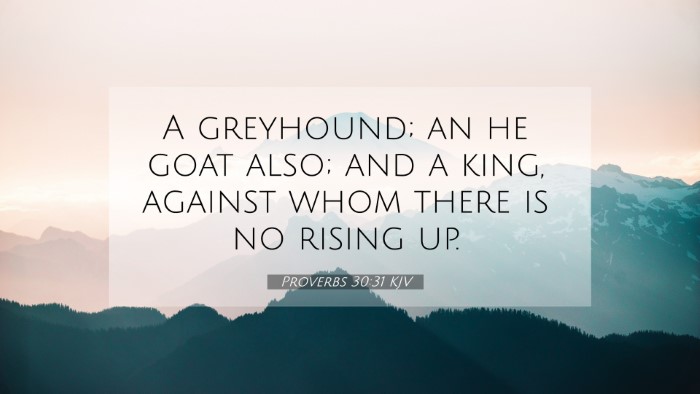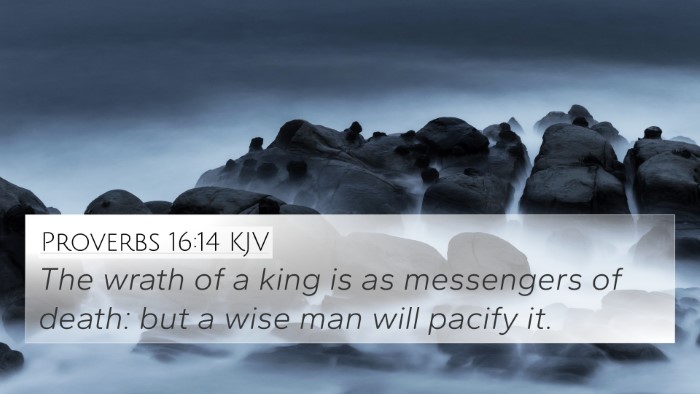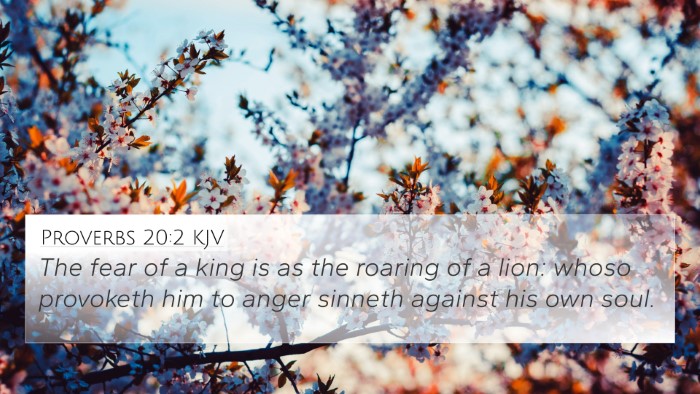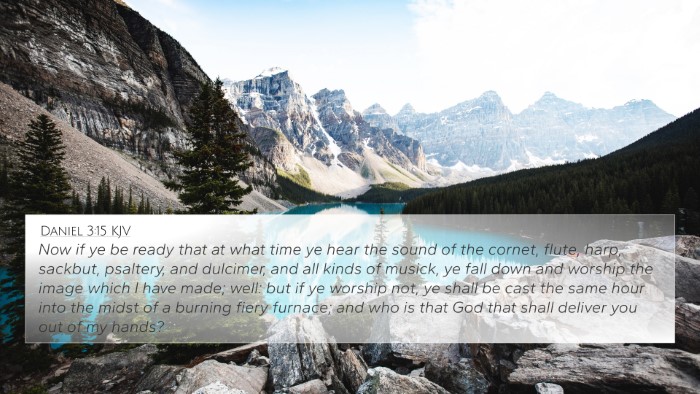Understanding Proverbs 30:31
Proverbs 30:31 states: "A greyhound; an he goat also; and a king, against whom there is no rising up." This verse presents a brief but powerful imagery within the context of the larger discourse in the Book of Proverbs.
Meaning and Interpretation
This verse draws attention to three distinct subjects — the greyhound, the he-goat, and the king. In biblical literature, each of these figures symbolizes certain attributes or characteristics applicable to human behavior and societal dynamics.
- Greyhound: Represents swiftness and readiness. The emphasis here is on agility and the ability to act decisively in a moment’s time.
- He-Goat: Symbolizes strength and leadership. The he-goat is often associated with dominance and the ability to confront challenges head-on.
- King: Embodies authority and power. The reference to a king, against whom there is no rising up, indicates a period of peace and unchallenged rule.
Insights from Public Domain Commentaries
Matthew Henry’s Commentary
Matthew Henry suggests that these three elements symbolize triumph over adversities. The greyhound and he-goat signify the necessity of speed and strength in leadership roles, while the king embodies the ultimate authority that unites these qualities.
Albert Barnes’ Notes
Albert Barnes adds that the imagery of these animals conveys an inherent order in society. The greyhound's speed denotes the rapid developments that can occur, while the he-goat’s assertiveness represents the kind of fierce leadership required to maintain stability under a king's rule.
Adam Clarke’s Commentary
Adam Clarke elaborates on the notion of strength and power. He highlights that the juxtaposition of these creatures with a king sets a profound tone, underscoring that true leadership must integrate swiftness and strength in facing challenges.
Thematic Links and Cross-References
Proverbs 30:31 can be connected with several other verses in the Scriptures, establishing a cohesive understanding of biblical leadership and authority. Here are some significant cross-references:
- 1 Kings 5:4: Highlights peace in the kingdom and reflects the unchallenged authority akin to that of the king in Proverbs 30:31.
- Proverbs 26:7: Discusses the implications of wisdom, synonymous with the attributes attributed to the he-goat and greyhound.
- 2 Samuel 23:20: Describes Benaiah's extraordinary feats, emphasizing strength and capability, mirroring the swift decisiveness of the greyhound.
- Daniel 2:37: Refers to a king’s superiority, tying into the concept of unchallenged authority in Proverbs 30:31.
- Isaiah 40:31: Discusses renewal of strength for those who wait on the Lord, somewhat reflecting the resilience of the he-goat.
- Psalms 20:7: Speaks of trust in the Lord over chariots and horses, akin to how the king and strong animals portray confidence and reliance on strength.
- Proverbs 21:1: Assures that the king's heart is in the hand of the Lord, reinforcing the idea of divine authority over earthly rulers.
- Exodus 15:3: The Lord as a warrior aligns with the strength and decisiveness that the he-goat and greyhound depict.
- Ephesians 6:12: Addresses spiritual authority and struggles, parallel to the king's prowess as depicted in Proverbs 30:31.
- Romans 13:1: Asserts that all authority comes from God, reinforcing the king's position in the verse.
Applications in Modern Christian Life
The elements of speed, strength, and authority in Proverbs 30:31 can apply to various aspects of modern life, particularly in leadership and personal development. Here are a few considerations:
- Leadership: Cultivate qualities of decisiveness and resilience in your own leadership roles, echoing the characteristics of the greyhound and he-goat.
- Spiritual Authority: Acknowledge the ultimate sovereignty of God over personal and communal leadership, understanding that authority is a divine grant.
- Preparation and Action: Be swift in response to challenges, embodying the readiness of the greyhound and the assertiveness of the he-goat.
Conclusion
Proverbs 30:31 encapsulates profound messages about authority and the qualities desirable in leaders. By cross-referencing this verse with others, one can engage in a comparative Bible verse analysis that underscores significant themes throughout the Scriptures, framing a holistic view of leadership and divine providence.





